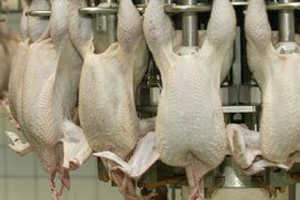HPAI: Severe losses for Dutch poultry sector

As a consequence of the highly pathogenic avian influenza (HPAI) outbreak, the Dutch cannot export poultry meat to markets beyond the European Union (EU) for the next three months. Losses could be up to €100 million.
This weekend, a 150,000 layer farm about 50 km south of Amsterdam was found to be infected with H5N8. This similar strain was also found this month on farms in Germany and the UK.
In the Netherlands, prices for poultry meat and breeding eggs are likely to go down on the short term. Exports to markets outside the EU will be cancelled for the next three three months, Jan Odink, chairman of the Association of Dutch Poultry Processing Industries (Nepluvi) told Dutch agricultural title Boerderij.
According to protocols, a country reports an outbreak of avian influenza at the World Organization for Animal Health (OIE) in Paris, France – after which countries do not import from this particular country. Approximately 25% of the total Dutch exports is exported to destinations outside the EU, Eurostat figures show.
Exports within the EU will be cancelled for only as long as the standstill will last in the Netherlands itself: 72 hours. It is however the case that no meat can be exported to countries inside the EU from a farm that is within a 10 km radius around the infected farm.
Total damage may be as high as €100 million, said Gert Jan Oplaat, chairman of the Dutch Union of Poultry Breeders.
South Korea
South Korea, recently hit very hard by H5N8, already announced to close its borders for Dutch breeding eggs and live broilers, and more countries are expected to do so. Tjeerd den Hollander, spokesman for the Dutch Organisation of Breeding Egg and Broiler Exporters (NVE), said: “Experience tells us borders will close.”
There had been talks with Japan and China to resume breeding egg and poultry exports as these had been cancelled due to an earlier low pathogenic AI outbreak. These discussions will remain frozen for some while now. Annually, the Netherlands export 3 billion breeding eggs and 12 million broilers to countries outside the EU.
Spread
There are reasons to believe that the outbreak in the Netherlands will only remain limited to this one farm in the village of Hekendorp. Immediate research on farms in the vicinity of the infected farm showed that other farms had not been infected. The 72 hour standstill is partly meant to figure out whether other farms in a 10 km radius around the farm have been infected.
Another reason to believe that the outbreak will not spread further is related to the farm’s location. The density of poultry farms in this area in the west of the Netherlands is relatively low. A high density is necessary for the disease to develop into a massive outbreak.
UK outbreak
It looks likely that the outbreaks in the Netherlands, Germany and the UK are related. The British Chief Veterinary Officer as well as the British Poultry Council have stated there is likely a connection between the outbreaks in these countries – and both point to migratory birds as being the most probable source of infection.












